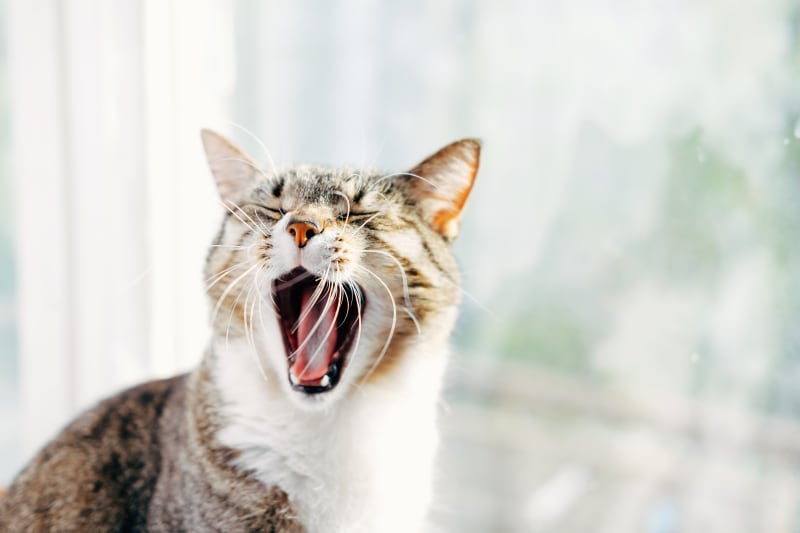Yes, cats can indeed die from stress, and it is important to be aware of this potential danger to our feline companions. Stress can have serious physical and emotional effects on cats, often leading to various health issues.
It is crucial to understand the signs of stress in cats and provide them with a calm and comfortable environment to prevent severe consequences.
Contents
Understanding The Impact Of Stress On Cats
Stress can have a significant effect on a cat’s well-being, both physically and mentally. Cats, just like humans, experience stress in various situations, such as changes in their environment, introduction of new pets, or loud noises. Understanding the physiology of stress in cats is crucial in recognizing its impact on their health.
When a cat is stressed, its body releases hormones such as cortisol, which can lead to a suppressed immune system and increased vulnerability to illnesses. This means that cats experiencing prolonged stress may be more prone to infections and diseases. Stress can also manifest in behavioral changes, like excessive grooming, aggression, or withdrawal.
Identifying stress indicators in cats is essential for their well-being. These signs may include changes in appetite, litter box avoidance, excessive meowing, or hiding. It’s important for cat owners to take note of these behavioral changes and provide a calm and stress-free environment for their feline companions.
Common Stressors For Cats
Cats can be sensitive creatures, and certain environmental factors can trigger stress in them. Changes in their routine are a major stressor for cats. Their daily rituals and activities provide them with a sense of security and familiarity. When these patterns are disrupted, it can cause distress and anxiety for them.
Social interaction is another aspect that heavily influences a cat’s stress levels. Cats have different personalities, and while some may enjoy socializing with humans and other animals, others may prefer solitude. Lack of socialization or forced interactions with unfamiliar people or animals can lead to increased stress levels in cats.
It is important for cat owners to be aware of these potential stressors and take the necessary steps to minimize their impact. Providing a calm and stable environment, maintaining a consistent routine, and respecting the cat’s social preferences can greatly help in reducing stress and promoting their overall well-being.
Health Issues Related To Stress In Cats
Stress in cats can lead to a range of health problems. One of the most common stress-induced issues is behavioral problems. Cats experiencing stress may exhibit behaviors such as excessive grooming, aggression, urinating outside the litter box, or even withdrawal.
| Stress and Its Link to Feline Illnesses | Stress-Related Complications in Aging Cats |
Stress can weaken a cat’s immune system, making them more susceptible to illnesses such as urinary tract infections and respiratory diseases. Additionally, stress may worsen pre-existing conditions such as asthma or inflammatory bowel disease. | As cats age, they may become more vulnerable to stress-related complications. Chronic stress can lead to the development or progression of cardiovascular diseases, diabetes, and hyperthyroidism. It’s important to provide a calm and stress-free environment for aging cats to maintain their health. |
It’s crucial for cat owners to recognize the signs of stress and take steps to alleviate it. Providing a safe and enriched environment, ensuring regular play and exercise, and using calming techniques like pheromone diffusers or music designed for cats can help reduce stress levels and promote their overall well-being.

Credit: citywildlife.org
Managing And Reducing Stress In Cats
Creating a stress-free environment for your cat is crucial to their well-being. Cats are sensitive creatures, and even minor changes in their surroundings can cause significant stress. To reduce stress, ensure that your cat has a quiet and safe space where they can retreat to. Provide hiding spots, such as cat trees or cozy beds, where they can feel secure.
Additionally, make sure your cat has access to fresh water, litter boxes, and a comfortable temperature in their environment. Avoid sudden loud noises or excessive activity that might startle or overwhelm your cat.
Regular playtime and mental stimulation are essential for reducing stress in cats. Engage your cat in interactive play with toys such as feather wands or laser pointers. This not only helps them release pent-up energy but also provides mental stimulation.
Introducing puzzle toys or treat-dispensing toys can also keep your cat mentally engaged and help alleviate stress. These toys provide a challenge and distract them from any potential stressors in their environment.
Regular playtime and mental stimulation can have numerous benefits in reducing stress for your cat. It helps them burn off excess energy, prevents boredom, and promotes a healthier lifestyle. By engaging in play and mental exercises, your cat will be less likely to exhibit stress-related behaviors like excessive grooming or aggression.
Furthermore, play and mental stimulation can strengthen the bond between you and your cat, providing them with a sense of security and comfort. Investing time in interactive play and mental activities is a simple yet effective way to reduce stress and promote overall well-being in your feline companion.
Frequently Asked Questions Of Can Cats Die From Stress? The Truth Might Surprise You!
What Would Cause A Cat To Die Suddenly?
Cats can die suddenly due to various reasons like heart disease, poisoning, trauma, organ failure, or infections. It’s crucial to monitor their health, provide proper nutrition, and seek veterinary care if any signs of illness or abnormal behavior appear. Regular check-ups help detect potential issues early.
Can Cats Die From Anxiety?
Cats can die from anxiety as it can lead to various health issues and weaken their immune system. It is important to manage and provide appropriate care for anxious cats to prevent severe consequences. Seek advice from a veterinarian for proper diagnosis and treatment options.
Can Human Stress Affect Cats?
Yes, human stress can affect cats. Cats are sensitive to their owner’s emotions and can pick up on stress through body language and behavior. This can lead to behavioral changes, such as excessive grooming or aggression. It’s important to create a calm and stress-free environment for both humans and cats.
Can Cats Sense Death Of A Person?
Yes, cats can sense the death of a person due to their heightened senses and keen intuition. They may exhibit changes in behavior and become more attentive or withdrawn during times of illness or nearing death. Cats provide comfort and companionship to those who are ill or dying.
Conclusion
In closing, it’s crucial to understand that cats can indeed suffer from stress, and it can have severe consequences on their health. From gastrointestinal issues to suppressed immune system, stress can lead to serious complications and even be fatal for our feline friends.
As responsible cat owners, it’s important to be aware of the signs of stress and take appropriate measures to create a calm and stress-free environment for our beloved pets.

Katie Lindsey is a passionate cat lover and founder of Cats Solution, a comprehensive resource for all things feline. With a lifelong love for cats and extensive knowledge in their care and behavior, she provides expert advice and solutions to cat owners. Through her website, Katie fosters a supportive community where cat enthusiasts can find guidance and heartwarming stories. A dedicated advocate for animal welfare, Katie also promotes responsible pet ownership and adoption. Join her on this purr-fect journey celebrating the joy of feline companionship.



